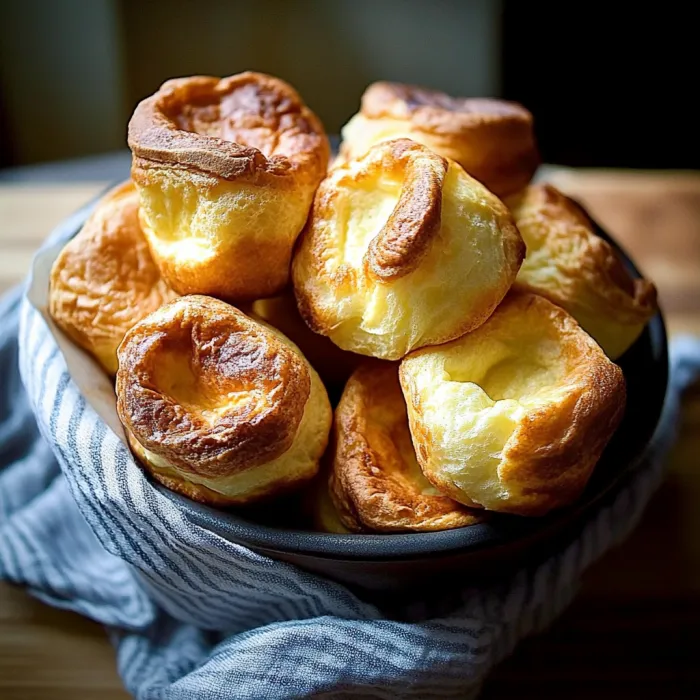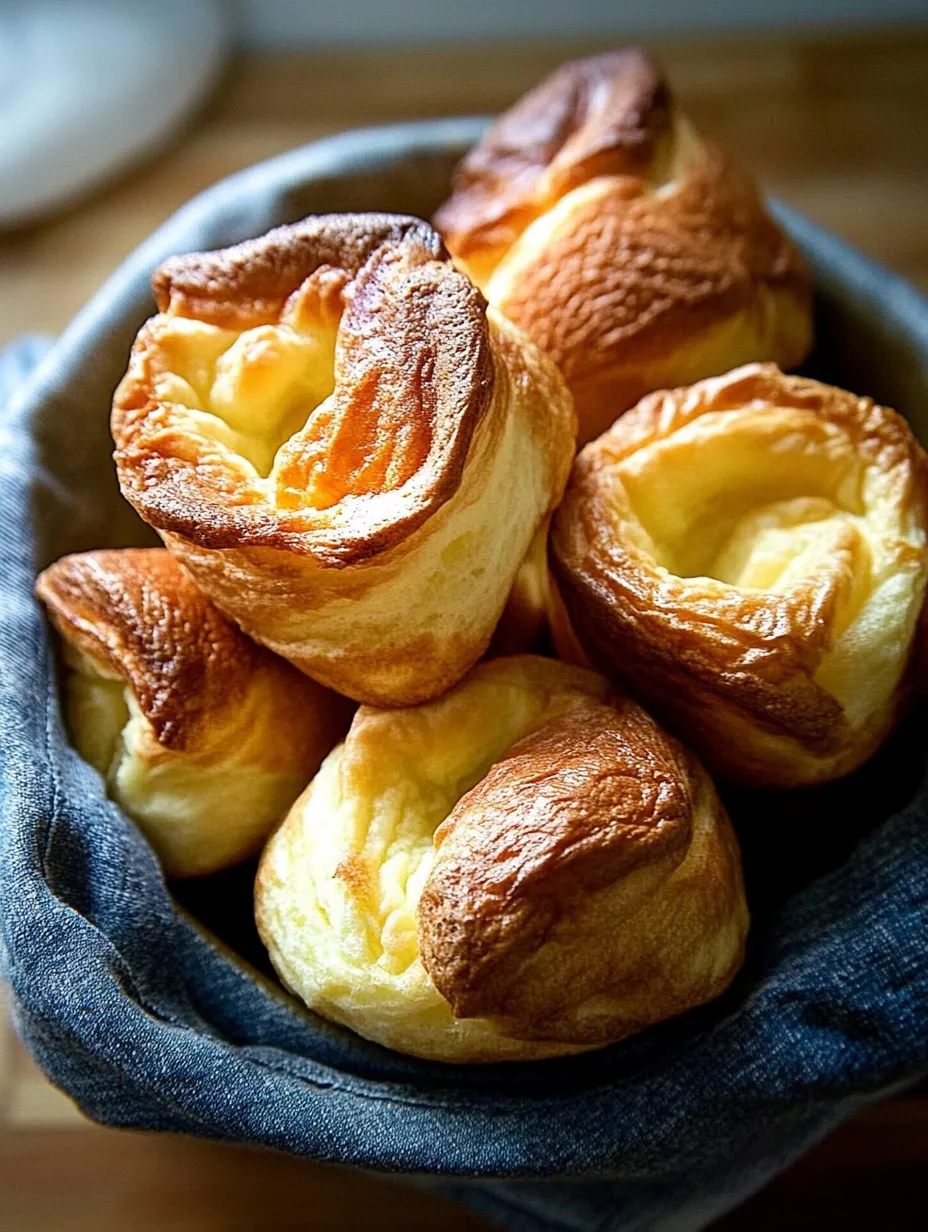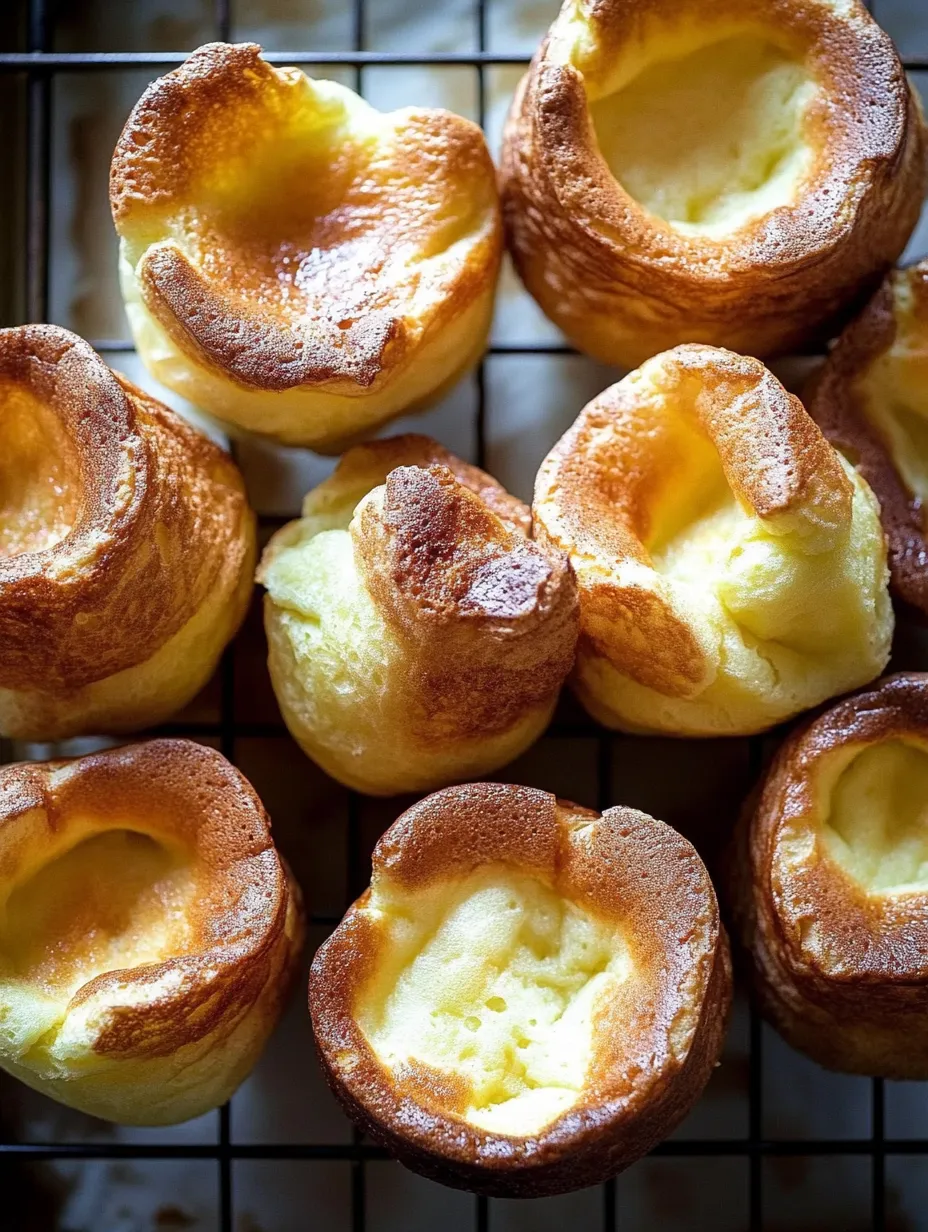 Save
Save
This Lofty Popovers recipe transforms simple ingredients into airy, cloud-like treats that puff dramatically in the oven. The crisp exterior gives way to a hollow, tender center – perfect for catching melted butter or savory sauces. These Yorkshire pudding-style popovers make an impressive side dish for Sunday roasts or a delightful breakfast option.
I discovered this popover method during a snowy weekend when I needed comfort food without a grocery run. Now my family requests these golden puffs of joy whenever we have a special meal needing that extra touch of magic.
Ingredients
- Softened butter for greasing and additional for serving creates the essential crisp exterior while preventing sticking
- 3 large eggs at room temperature provide the crucial structure and lift that makes popovers rise dramatically
- 1 1/2 cups room temperature milk preferably 2% offers perfect moisture and protein content for ideal texture
- 1 1/2 cups bread flour or all purpose flour bread flour gives maximum height but either works beautifully
- 1 teaspoon kosher salt Diamond Crystal brand balances the flavor perfectly use half if using Morton or fine sea salt
- 3 tablespoons melted butter enriches the batter and enhances browning
Step-by-Step Instructions
- Prepare Your Oven and Pan
- Preheat your oven to 425°F positioning a rack in the center. This high initial temperature creates the steam that makes popovers rise. Thoroughly grease all 12 wells of your muffin tin with softened butter ensuring you coat the sides completely to prevent sticking.
- Bring Ingredients to Temperature
- If your eggs are cold place them in a bowl and cover with hot tap water for exactly 10 minutes. Cold eggs dramatically reduce rise. For the milk microwave it for 1 minute until it reaches approximately 75°F. Warm ingredients create more steam and therefore more dramatic height.
- Blend the Batter
- Place eggs milk flour and salt in a blender and blend for 30 seconds until completely smooth. A blender eliminates lumps that would weigh down your popovers. Add the melted butter and blend for another 15 to 20 seconds until fully incorporated.
- Fill the Pan
- Pour the batter into the prepared muffin tin filling each well halfway. Distribute any remaining batter evenly among all wells. Filling only halfway gives the batter room to climb and create that impressive height.
- Bake with Precision
- Transfer immediately to the oven and bake for 20 minutes at 425°F. The initial blast of heat creates the steam pocket that makes popovers rise. Reduce temperature to 350°F and bake 10 minutes more allowing the structure to set while continuing to brown.
- Serve Immediately
- Remove from oven and transfer to a serving bowl right away. Popovers are at their absolute best within minutes of baking when the exterior is crisp and the inside is still steamy. Serve with softened butter for spreading.

The bread flour revelation changed my popover game forever. While testing this recipe I discovered that its higher protein content creates stronger structure to trap steam creating truly impressive height. However there is something especially tender about the allpurpose flour version that my children actually prefer.
Pan Selection Matters
While specialized popover pans exist I strongly recommend using a standard metal muffin tin. The closer wells help the batter climb higher as it bakes creating more dramatic results. In my experience traditional popover pans can actually lead to sticking issues and make removal difficult resulting in deflated or torn popovers. A quality metal muffin tin preheated properly gives perfect release and ideal shape every time.
Temperature Secrets
The room temperature ingredient rule isn't just chef snobbery its crucial chemistry. Cold eggs and milk create less steam and therefore less dramatic rise. If you frequently make popovers consider keeping eggs at room temperature as a standard practice. The microwave milk trick works brilliantly in a pinch but for ultimate convenience simply pull your ingredients out about an hour before baking. Your patience will be rewarded with noticeably higher popovers.
Serving Suggestions
While traditional Yorkshire pudding accompanies roast beef these versatile popovers pair beautifully with nearly any meal. Try them alongside soups or stews where their hollow centers can catch delicious broth. For breakfast fill them with scrambled eggs or jam for a special treat. My personal favorite is serving them with honey butter made by whipping equal parts softened butter and honey until light and fluffy.

Recipe FAQs
- → What's the difference between bread flour and all-purpose flour for popovers?
Bread flour produces slightly higher popovers due to its higher protein content, which creates stronger gluten networks that trap more steam during baking. All-purpose flour creates excellent popovers with possibly better flavor and texture. Either works well, so use what you have on hand.
- → Why must ingredients be at room temperature?
Room temperature ingredients create a smoother batter that rises more consistently. Cold eggs and milk can shock the batter, inhibiting proper rising. Warm ingredients also help create steam faster in the hot oven, which is what gives popovers their signature hollow centers and height.
- → Can I make the batter ahead of time?
It's best to bake popover batter immediately after mixing. The air incorporated during mixing helps create lift, and this diminishes over time. For best results, have all ingredients measured and ready, then mix and bake right away.
- → Why use a regular muffin tin instead of a popover pan?
While traditional popover pans have deeper, narrower wells, a standard 12-cup muffin tin actually produces more consistent results for this recipe. The batter spreads better among 12 wells, and the finished popovers are less likely to stick, preventing damage when removing them.
- → What causes popovers to collapse?
Opening the oven door too early is the main culprit for collapsed popovers. Other causes include under-baking, inaccurate measurements, or overmixing the batter. Follow the two-temperature baking method (425°F then 350°F) for properly structured popovers that maintain their shape.
- → How do I know when popovers are done?
Properly baked popovers should be dramatically puffed, deeply golden brown, and have a firm, crisp exterior. The full 30-minute baking time (20 minutes at high heat + 10 at lower heat) ensures they're cooked through and won't collapse when removed from the oven.
